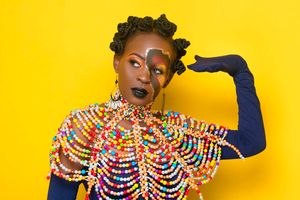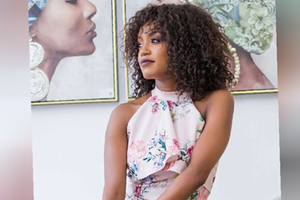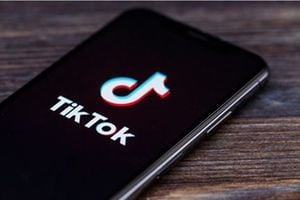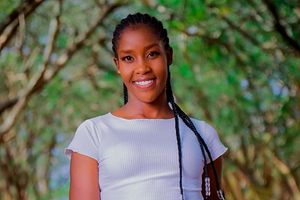
TikTok content creators from left: Mitchelle Joyce, Vincent Onyango, George Ambogo and Thomas Emmanuel Nyambuto.
The TikTok timer is counting down. Your content is ready to drop. But wait—will this get you trending or cancelled? Welcome to the daily gamble faced by Kenya's digital warriors.
In the wild west of Kenya's online scene, Gen Z creators aren't just making content—they're playing with fire. Every post, every dance move, every controversial take is one algorithm away from either viral fame or digital doom.
Why? Because yesterday's cool can be today's problematic. One wrong move can detonate your entire brand.
We asked several content creators to tell us how they balance everything without losing it. Here’s what they said. Though it’s fun behind the scenes, expectations can ruin the experience.
George Ambogo

George Ambogo famously known by his stage name Ombuti Matata.
George Ambogo, 25, is an online content creator, known by his stage name Ombuti Matata.
“I started creating content for fun, never thinking it could lead to something more. One day, I made a few jokes, and someone gave me a tip. That made me realise I could do more with my content, so I began creating videos regularly. I focus on connecting with the youth because I’m young myself, and I want to talk about the challenges we face today.
My first video wasn’t meant to be a content creation project; it was just something I did for fun during the Covid-19 lockdown. I used an Infinix phone, made a simple video saying, “What’s up, guys?” and posted it on WhatsApp, where I had about 50 views. I didn’t even have Instagram at that point, just WhatsApp and Facebook.
The next day, I shared it on Instagram. A friend told me to check out Seth Gor, and he encouraged me to repost my video. To my surprise, Seth Gor shared my video on his Instagram, which brought me more attention. At first, people recognised my costumes more than my face, but over time, they started to notice me.
I’m more of a listener, even though I’m talkative. I listen to people’s stories, and from my own experiences, I write and share what I’ve learned. Many people think their challenges are unique, but when shared, others often say, “Oh yeah, I can relate to that.” By sharing my experiences, I’ve been able to connect with a large audience. As a young person, I speak to other youths about the issues we all face, knowing that we’re not alone in our struggles.
Fame can be exciting, but it’s not all it's cracked up to be. When you’re famous, people assume you have access to opportunities, connections, and a perfect life. But it comes with its own challenges. I believe in being different and surprising my audience with unexpected content. While many creators try to follow trends, I prefer to stick to what’s true to me. I started creating content in Luo because I wanted to bring something new— modern Luo comedy. In my skits, I use real settings, like offices and luxury cars, instead of pretending a house is an office. It’s about authenticity.
Criticism is part of the journey, and I take it positively. I document my experiences because I believe in taking care of my mental health. Balancing mental health with content creation is essential, and it’s something I prioritise. I love what I do, and I think content creators should be well compensated because they do what they love and bring joy to others. Even though it’s fun behind the scenes, expectations can sometimes ruin the experience. If you have a budget, you need to plan carefully to stay within your means.
On average, I earn between Sh50,000 to Sh100,000 a month, but I don’t make money from YouTube. Most of my earnings come from collaborations and brand partnerships. I don’t have high expectations because I know that results can vary. Not everyone will like my content, and that’s okay. What matters is reaching my audience and staying true to myself.
One thing that sets my content apart is my accent, which I got from my uncle who was deported from the U.S. He still uses an American accent and acts like he’s abroad. My accent wasn’t meant to be a character at first; I used it for one video where I played a boss. But the character became popular, and now it’s part of my style.
I avoid viral content like explicit scenes because it doesn’t fit my brand. I want to create content that resonates with my audience without compromising my values. Quality engagement is more important than temporary attention.”
The more hate I get, the more motivated I am

Mitchelle Joyce, 21, is a content creator based in Nairobi, commonly known by her stage name Mjaka Mfine.
Mitchelle Joyce, 21, is a content creator based in Nairobi, commonly known by her stage name Mjaka Mfine
“I've always loved making people happy and sharing my creativity with the world. Acting was my dream, and I also enjoy spoken word and performing in set books. I’m a thespian. Acting is not just a passion but my hustle, and I have a lot of creativity in this field. Most of my content reflects what's happening in the world around me. One of my viral videos was about asking for my fare balance in a Matatu. It sparked different reactions. I often find inspiration from current events and create content based on them.
I work with a small team, and I make sure my content reaches three groups: millennials, Gen Z, and younger viewers. My aim is to make everyone happy by sharing funny moments and things they can learn from. I manage my time carefully, balancing content creation with my normal life. For instance, I dedicate Tuesdays to recording content with my team. I store the videos and post one each day. Afterward, I give myself time to relax.
Being famous has its challenges. Fame brings a lot of pressure because people expect more from you. I didn’t anticipate blowing up so quickly, usually, fame builds up over time, but for me, it happened all at once. It’s not been easy, but I’m adjusting.
There are critics and haters who can be tough to deal with. People expect you to keep up with trends and continue producing the same type of content that made you famous. When I posted my viral video, I never intended for it to trend; it just happened. Content creation involves finding relatable topics, staying on top of trends, and dealing with hate.
I try to ignore negative comments and focus on the positive. The more hate I get, the more motivated I am to continue creating good content. Eventually, when they see you thriving, the haters give up.
Meeting great minds like Eric Omondi, Eddie Butita, YY Comedian, and Churchill has been amazing. These were people I used to watch on TV or online when I was younger, and now I have the chance to work with them. It’s incredible to gain recognition and collaborate with famous people.
However, fame has its downside. You might meet fans who say, “Hey, Michelle, I love your content,” but some of these people could be the ones spreading negativity. It’s hard to know who’s genuine. Being a celebrity means dealing with both admiration and criticism. People will follow your life closely, and some will spread rumours about you. That’s the cost of fame.
Being a thespian and acting in set books is what brings in money for me. I earn about Sh35,000 a month for acting set books. Tiktok hasn’t paid me yet, but it has brought me brand partnerships. Currently, I’m working with Mobile Hub brand. I haven’t faced the pressure of balancing content creation with school yet, but I know it can be tough. I’m starting school in January, and from what my friends in the industry say, being famous while studying can be very demanding.”
Getting paid for gigs has been a challenge

Thomas Emmanuel Nyambuto, 22, is an award-winning comedian of the year 2024/2025 at JKUAT, stage name Manu Mkisii.
Thomas Emmanuel Nyambuto, 22, is an award-winning comedian of the year 2024/2025 at JKUAT, stage name Manu Mkisii.
“My passion for content creation started early. Growing up as a Seventh Day Adventist Church, I enjoyed performing skits and acting out Bible stories. I was good at it, so in high school, I joined a drama club. Later, in college, I began creating content and have made around 400 clips so far.
In my first year of college, I joined a content creation group, and we made skits on weekends. However, the group eventually fell apart due to conflicts and lack of commitment. Some members had different ideas, and not everyone participated consistently, making it hard to continue.
In my second year, I decided to create content on my own. Balancing this with school was tough, especially since my studies were demanding. But by my fourth year, as I was finishing school, I made content creation my full focus.
I create a variety of content that reflects everyday life, school, church, love stories, and daily experiences. My inspiration comes from watching videos, listening to people, or observing life around me. I then turn these moments into relatable, funny content that people can connect with.
I don’t follow Tiktok or social media trends; I focus on creating content that is timeless and relatable. I believe content creators should focus on sharing messages rather than chasing trends, as following trends can lead to regrettable decisions later. My goal isn’t fame, but to create content that makes someone smile and think, "This is good content." I want to deliver positive messages that people can relate to.
One of the biggest challenges I faced as a content creator was finding a reliable team. To do comedy skits, you need at least three or four people, a cameraman and a few actors. Often, I had a script ready, but the cameraman wasn’t available, or only one actor showed up when the script needed more. This meant we had to postpone shoots. Many team members had heavy school workloads and couldn’t balance both, so some withdrew from content creation. Managing time and balancing responsibilities is crucial in content creation.
Financing was another challenge. You need money for a camera, lighting, and microphones. For now, we use our phones, and some friends with iPhones or Sony phones help us shoot. They work well as cameras, and we manage without professional lights, using natural sunlight instead. Sometimes, we even shout instead of using a microphone.
I've also faced difficulties with payments for gigs. One betting company didn’t pay me Sh20,000 for a gig. This has happened several times.
Many upcoming content creators face the same issue, where they do the work, but don’t get paid. This can be discouraging, and many quit because of broken promises. Although I don’t earn from social media yet, I trust the journey and aim to keep creating content for the next five to 10 years. I look up to creators like Crazy Kennar and hope to take my content to the next level, building a community and incorporating new elements into my work.”
I avoid reading negative comments. They can really bring you down.
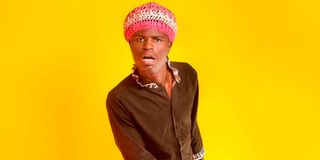
Vincent Onyango (Raazy Junior). Vincent Onyango, aka Raazy Junior, went from casual TikTok videos to brand collaborations and mainstream TV appearances.
Vincent Onyango, 23, is a comic content creator and influencer known by the stage name Raazy Junior.
“When I was in school, I always loved acting in dramas. But in 2020, when the Covid-19 pandemic shut everything down, including schools, people had a lot of free time on their hands. That’s when Tiktok became a big hit. I decided to try it out and started making videos, not knowing it would kick start my career as a Tiktok actor. At first, I wasn’t serious. I made a video just to see if I could do it. My first video didn’t do well, so I wasn’t discouraged. I kept trying and posted more videos, imitating popular content that was trending. Soon, people started noticing and telling me I had potential as an actor. This motivated me to keep going. After posting a few more videos, one of them went viral. It was a video showing the contrast between a poor area and a mansion, and people could relate to the cultural differences it highlighted.
In the beginning, I wasn’t working with brands. I was just doing small hustling jobs and traveling. I remember when I earned Sh500 from a job, I would spend Sh300 on the shoot, covering transportation, lunch, and paying people who helped me. Now, I work with brands like Odi Bet Company, Ron Dental, Legacies restaurant, and Iceland Kenya. I allocate a budget of around Sh20,000 per month for video shoots.
It’s all about reinvesting in your work to make it better. My pricing depends on the number of videos and the brands I work with. For example, for four videos, I charge Sh100,000, and for a single video and story, I charge Sh50,000. These rates can change depending on my contract with brands.
To show that I was ready for bigger opportunities, I started creating videos for other brands as a way to demonstrate my skills. I once created a video for a restaurant, sent it to them, and they loved it. That’s how I got my first brand collaboration. It wasn’t easy, but persistence paid off.
Tiktok can bring quick fame, with millions of views from around the world, but it doesn’t always translate into money. I’ve seen many content creators and influencers on Tiktok who gain fame but don’t know how to make money from it. Big brands often prefer platforms like Instagram because the audience tends to be more genuine there. I’ve learned to avoid reading negative comments. They can really bring you down.
One of my dreams has always been to appear in mainstream shows. Last year, I got a chance to be part of Citizen TV's show Becky where I played an extra. It was a huge achievement for me.
Now, I have the financial stability to focus on my career and continue working towards my goals. Looking ahead, I plan to continue with my education as I dropped out of school at form two. I want to study art and drama to gain more knowledge. My dream is to become as successful as those I admire.”

